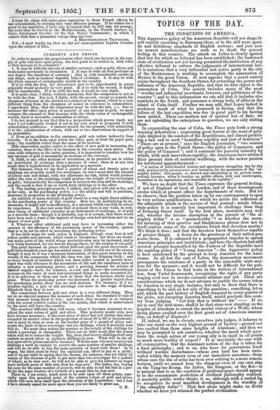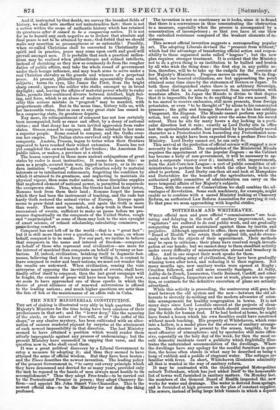TOPICS OF THE DAY.
THE CONQUESTS OF AMERICA.
THE Aggressive policy of the American Republic will not shape it- self exactly according to European ideas, or to the still more speci- fic) and fastidious standards of English notions ; and just now its newest manifestations are such as to shook the general feeling in this country. The attack on Lobos is clearly against that law for which no tribunal has been established ; the backward state of civilization not yet having permitted the institution of any effective tribunal to enforce the judgments of international law. It is notorious that a very influential and active party in the city of the Montezumas is working to accomplish the annexation of Mexico to the great Union. It now appears that a secret society exists throughout the Southern States, for extending the power and influence of the American Republic, and that its first object is the annexation of Cuba. The society includes many of the most " worthy and influential merchants, lawyers, and politicians of the country "; and to this information we can add that it includes also numbers in the North, and possesses a strong body of allies in the island of Cuba itself. Further we may add, that Lopez lacked in acuteness mach of what he possessed in daring, and that the failure of the last expedition was due in great part to his having been misled. These are matters not of opinion but of fact; we are not upholding the enterprises in question, we are only stating them.
In expounding the case of Cuba, the Times puts forth a strong warning dehortation ; expressing great horror at the want of prin- ciple implied in the conduct of the Republicans, and almost predict- ins a bad end to such "boundless cupidity and lust of dominion." " There are at present," says the English journalist, " two courses of policy open to the 'United States—the policy of Commerce, and the policy of Conquest "; and it contrasts the peaceful industry by which, with such marvellous rapidity, the Americans have attained their present state of material wellbeing, with the newer passion for territorial aggrandizement- " A nation of hard-headed traders and speculators struggling day by day with praiseworthy perseverance and intensity for the possession of the 'al- mighty dollar,' this people, so shrewd and calculating in its private trans- actions, becomes, when it touches on public affairs, wild and extravagant, boundless in its aspirations, and insatiable in its cupidity."
We have no doubt that the Times expresses the general feeling, if not of England at least of London, and of those drawingroom circles which at present officer the departments of state. But let us observe, that the position taken up by our contemporary is open to very serious qualifications, to which we invite the reflection of the admirable minds in the service of that journal; minds whose state-policy it is scarcely less important to challenge than that of Downing Street itself. In the first place, moralists may well ask, whether the intense absorption in the pursuit of "the al- mighty dollar" is so "praiseworthy "? or whether the scorn- ful meaning of that sportive and blasphemous phrase does not in itself confess some of the revulsions which that devotion merits ? We think it does ; and that the devotees know themselves capable of greater things. A desire for the greatness of their nation pos- sesses them. It is enhanced by a propagandist impulse to spread American principles and institutions ; and here the obsolete but still revered precepts bequeathed by the Fathers of the Republic meet the aspiring policy of " Young America "—the Aggressive policy is here sanctioned by the precept to keep America for the Ame- ricana. In all but the case of Lobos, the Annexation movement presupposes the existence of a party in the annexable state anx- ious for the measure; and it would not be difficult for the pub- licists of the Union to find texts in the writers of international law, from Vatteldownwards, recognizing the right of any party waging civil war to invoke external alliance and aid. These are considerations which we do not advance to justify the course taken by America in any single instance, but only to show that there is something to be said on her side of the question; something, let us add, which the past history of English conquest in every quarter of the globe, not excepting America itself, would preclude this coun- try from judging. "Let him that is without sin" — If we are to cast the first atone, shall it be that stone now standing on the heights of Abraham to record the mortal victory of a Wolfe, whose dying glance exulted over the first great act of American annexa- tion, on behalf of England ?
If, indeed, we are to elevate ourselves into judges, it behoves to take our stand on the very highest ground of history—ground not less exalted than those same heights of Abraham; and then we may be prompted to ask ourselves, whether the mood which ques- tions the rough action of our young ally is in itself in all points so much more worthy of respect ? It is inevitably the case with all communities, that the dominant notion of the day is taken for a final philosophy ; and to us, who have for generations lived without warlike disturbance—whose own land has been unin- vaded within the memory even of our immediate ancestors—from whose ears the din of arms has been ever retiring to a more remote horizon, until we cannot hear the clangour even of our own sins on the Yang-tse-Keang, the Indus, the Rangoon, or the Kei—it is natural that to us the condition of profound peace should appear
to be the consummate perfection of civilized philosophy realized. A masterly public writer thinks it so, although with a curled lip he recognizes its most manifest development in the worship of " the almighty dollar"! That fact, alone might make us doubt whether we have yet attained the perfect civilization.
And if, instructed by that doubt, we survey the broadest fields of history, we shall note another not =instructive fact: there is not a nation within the scope of authentic history which has retained
its greatness after it ceased to be a conquering nation. It is not for us to hazard any such negative as to declare that absolute and
final peace is not to be attained by man; God forbid that we should make any assertion so presumptuous or so untenable ! Possibly, when so-called Christians shall be converted to Christianity m spirit and in practice, peace may come upon earth and good-will prevail amongst men. It is probable that such a practical millen- nium may be realized when philanthropic and refined intellects, instead of shrinking as they now so commonly do from the rougher duties of public affairs, may take the whole round of government under their benign influence, and may teach arms to serve under a real Christian chivalry as the guards and winners of a perpetual peace. At present, philanthropy shrinks squeamishly from such subjects; turns its eyes, like James the First, from the bright sharp sword ; ignores the soldier who stalks amongst us in broad daylight ; and, leaving the affairs of material power wholly to ruder folks, permits that continued divorce between intellect, high feel-
ing, and force, which is an abuse of modern statesmanship. Pos- sibly this serious mistake in " progresS" may be mended, with proportionate effect. But in the mean time, history tells us, with her inexorable voice, that as soon as any great state has ceased to be a conquering state, its greatness departs.
Nay more, its relinquishment of conquest has not less certainly been accompanied, both as cause and effect, by a decay of national virtue ; and that decay. has in turn invited aggression from ruder states. Greece ceased to conquer, and Rome subdued to her arms a superior people. Rome ceased to conquer, and the Goths over- ran her empire. The Italian states survived only while they made conquests. Austria, Prussia, began to totter when their frontiers appeared to have reached their widest extension. Russia has not yet completed the onward march of her borders; the American Re- public takes, or makes, a province at a stride. The lesson conveyed in those more ancient subjugations of great states by ruder is most instructive. It seems to mean this: as soon as a people, secured from war, lapped in luxury, or in its mo- dern imitation "comfort," directs its attention solely to material interests or to intellectual refinements, forgetting the condition by which it attained to its greatness, and neglecting to maintain its physical vigour, then some ruder nation, whose discipline supplies that neglected element of national power, is permitted to supersede the overgrown state. Thus, when the Greeks had lost their virtue, Romans took from them their land ; Romans forgot the lesson which they had been the instrument of teaching, and the rude but hardy Goth restored the animal virtue of Europe. Europe again seems to grow faint and squeamish, and again the Goth is more than ready. There must be, indeed, a deep truth in these broad successions of evente, sufficient to make us pause before we pro- nounce dogmatically on the conquests of the United States, rough and " unprincipled " as some of them may look to the nice eyesight of exact science, of refined scholarship, oaloulating- commerce, or peace-loving comfort. Conquest has not left off in the world—that is a " great fact" : but it is still more than ever a question, in whose name, on whose behalf, conquest is to be made. For our part, we incline to believe
that conquests in the name and interest of freedom—conquests on behalf of those who represent real civilization—are more for the interest of mankind than conquests on behalf of tyranny or bar- barism. If, indeed, civilization, betaking itself to dogmatic fast- nesses, believing that it can keep peace by willing it, is content to leave conquest to ruder and baser nations, we must not wonder that the results are untoward. When civilization, ceasing the vain enterprise of opposing the inevitable march of events, shall have finally allied itself to conquest, then the last great campaign will be fought, the crusade of peace will have been begun. Just now, we seem to have approached one of those epochs in which the choice of great alliances or of renewed subversions is offered to the leading nations ; and much higher questions are astir than the fate of fish or the maintenance of an effete rule in Cuba.



























 Previous page
Previous page